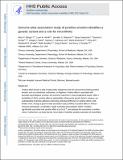| dc.contributor.author | Wingo, Aliza P. | en_US |
| dc.contributor.author | Almli, Lynn M. | en_US |
| dc.contributor.author | Stevens, Jennifer S. | en_US |
| dc.contributor.author | Jovanovic, Tanja | en_US |
| dc.contributor.author | Wingo, Thomas S. | en_US |
| dc.contributor.author | Tharp, Gregory | en_US |
| dc.contributor.author | Li, Yujing | en_US |
| dc.contributor.author | Lori, Adriana | en_US |
| dc.contributor.author | Briscione, Maria | en_US |
| dc.contributor.author | Jin, Peng | en_US |
| dc.contributor.author | Binder, Elisabeth B. | en_US |
| dc.contributor.author | Bradley, Bekh | en_US |
| dc.contributor.author | Gibson, Greg | en_US |
| dc.contributor.author | Ressler, Kerry J. | en_US |
| dc.date.accessioned | 2017-04-06T03:19:10Z | |
| dc.date.issued | 2016 | en_US |
| dc.identifier.citation | Wingo, A. P., L. M. Almli, J. S. Stevens, T. Jovanovic, T. S. Wingo, G. Tharp, Y. Li, et al. 2016. “Genome-wide association study of positive emotion identifies a genetic variant and a role for microRNAs.” Molecular psychiatry :10.1038/mp.2016.143. doi:10.1038/mp.2016.143. http://dx.doi.org/10.1038/mp.2016.143. | en |
| dc.identifier.issn | | en |
| dc.identifier.uri | http://nrs.harvard.edu/urn-3:HUL.InstRepos:32072045 | |
| dc.description.abstract | Positive affect denotes a state of pleasurable engagement with the environment eliciting positive emotion such as contentment, enthusiasm, or happiness. Positive affect is associated with favorable psychological, physical, and economic outcomes in many longitudinal studies. With a heritability of ≤64%, positive affect is substantially influenced by genetic factors; however, our understanding of genetic pathways underlying individual differences in positive affect is still limited. Here, through a genome-wide association study (GWAS) of positive affect in African American participants, we identify a single nucleotide polymorphism (SNP), rs322931, significantly associated with positive affect at p<5×10−8, and replicate this association in another cohort. Furthermore, we show that the minor allele of rs322931 predicts expression of microRNAs miR-181a and miR-181b in human brain and blood, greater nucleus accumbens reactivity to positive emotional stimuli, and enhanced fear inhibition. Prior studies have suggested that miR-181a is part of the reward neurocircuitry. Taken together, we identify a novel genetic variant for further elucidation of genetic underpinning of positive affect that mediates positive emotionality potentially via the nucleus accumbens and miR-181. | en |
| dc.language.iso | en_US | en |
| dc.relation.isversionof | doi:10.1038/mp.2016.143 | en |
| dc.relation.hasversion | http://www.ncbi.nlm.nih.gov/pmc/articles/PMC5339071/pdf/ | en |
| dash.license | LAA | en_US |
| dc.title | Genome-wide association study of positive emotion identifies a genetic variant and a role for microRNAs | en |
| dc.type | Journal Article | en_US |
| dc.description.version | Version of Record | en |
| dc.relation.journal | Molecular psychiatry | en |
| dash.depositing.author | Ressler, Kerry J. | en_US |
| dc.date.available | 2017-04-06T03:19:10Z | |
| dc.identifier.doi | 10.1038/mp.2016.143 | * |
| dash.authorsordered | false | |
| dash.contributor.affiliated | Ressler, Kerry | |


